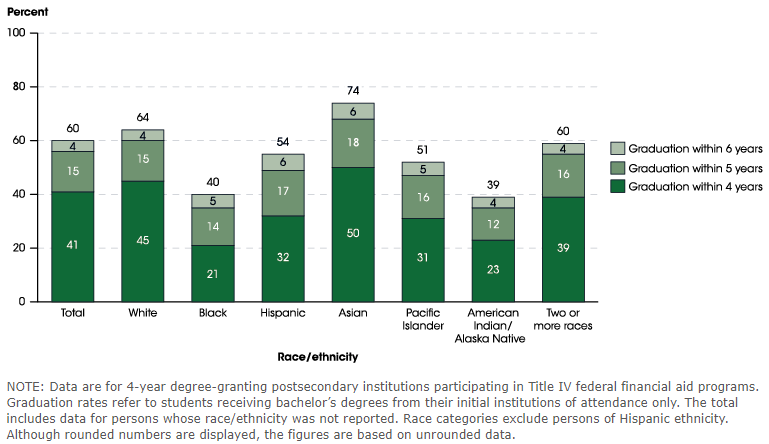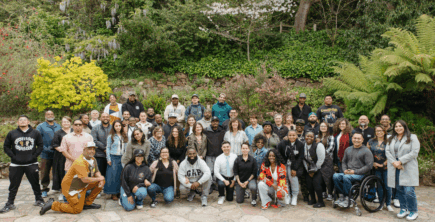
LGBT

I grew up in a family with modest means in an agricultural community, and many of the people I went to high school with never completed college. As the daughter of a teacher, pursuing higher education was something I never questioned. I was fortunate to have family members who not only encouraged and expected me to continue my learning journey, but who also understood how to navigate the system—from SAT and ACT tests to financial aid to understanding where to seek support when I needed it.
Unfortunately, for many students who are low-income or who are the first in their family to attend college, their story isn’t always the same. Getting accepted into and paying for college are just the first steps. The barriers aren’t just academic or financial, they are also social and cultural. Once on campus, students are expected to navigate complex and often-siloed systems. For someone who is the first person in her family to set foot on a college campus, it can be daunting.
Our country is becoming increasingly diverse; the middle class is shrinking; college tuition is skyrocketing; and more students are working to support themselves and their families. Higher education has been slow to adapt to meet the needs of 21st century students. “Non-traditional” students make up 40 percent of the undergraduate population, and that number is only expected to increase. Black and Latinx students graduate at rates about 20 percentage points lower than White and Asian students. And the rates are even more startling when looking across income levels. Only 16 percent of low-income students complete college vs. 60 percent of wealthy students.
The current global pandemic, uprising for racial justice, and economic downturn only further elevate the need for colleges and universities nationwide to act now to re-imagine a higher education system that is more student-centered and responsive to the needs of the 21st century student. It’s not only an economic imperative, it’s an equity imperative.

SOURCE: U.S. Department of Education, National Center for Education Statistics, Integrated Postsecondary Education Data System (IPEDS), Winter 2016-17, Graduation Rates component. See Digest of Education Statistics 2017, table 326.10
Fortunately, a number of higher education-supporting organizations are working diligently to spearhead the transformation needed to better serve Black, Indigenous, people of color (BIPOC), and low-income students and significantly reduce the disparities in completion rates.
The current global pandemic, uprising for racial justice, and economic downturn only further elevate the need for colleges and universities nationwide to act now to re-imagine a higher education system that is more student-centered and responsive to the needs of the 21st century student. It’s not only an economic imperative, it’s an equity imperative.
Intermediaries for Scale (IFS)—an initiative launched earlier this year by the Bill & Melinda Gates Foundation—is one such effort. IFS brings together 13 intermediary organizations that support and represent networks of colleges and universities across the country. These intermediaries will guide hundreds of colleges through a transformation process to create more student-centered campuses and reduce equity gaps in graduation rates.
The participating organizations were selected because they are uniquely positioned to play this role. The intermediaries bring both individual and collective strengths to the IFS community through their ability to represent the diversity of higher education—ranging from smaller place-based organizations, to those working specifically with Black, American Indian, or Latinx students, to national associations representing some of the largest and most recognized campuses and state systems.
Leading sector-wide transformation is big work. Tides’ role is to help IFS intermediaries prioritize needs and further build their capacity to guide colleges through the transformation process.
Given that the overarching goal of this initiative is one of equity—to drastically reduce gaps in graduation rates by race and income—means that equity is also a throughline in our approach to capacity building. Additionally, our strategy centers on elevating the voices of those who are most impacted by this work (college students and staff) and creating opportunities for shared prosperity through having a diversified network of partners.
There are two primary ways we are implementing this:
Our strategy centers on elevating the voices of those who are most impacted by this work (college students and staff) and creating opportunities for shared prosperity through having a diversified network of partners.
At Tides, we believe the transformation of higher education needs is impossible without meaningfully engaging students. With the IFS initiative, we’re finding ways to cross boundaries to connect students, intermediaries, and colleges to create a more equitable higher education system—one that truly supports all students in achieving their potential and creating a better life for themselves and their families. One that truly serves students, regardless of their skin color or income.
To learn more about how Tides is supporting an equity-based approach to capacity building or to be added to our list for consulting opportunities, please contact us.

LGBT

Corporate Partners

Philanthropy

Read the stories and hear the voices of social change leaders fighting for justice.